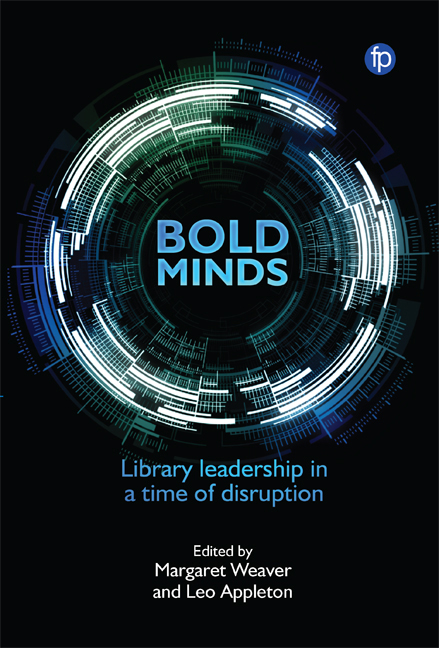Book contents
- Frontmatter
- Contents
- Foreword
- Contributors
- Preface
- Introduction
- Section 1 Views From the Corridors of Power: The Political and Global Perspective
- Section 2 The Re-Birth of Libraries – New Business Models and Re-Generation of Services
- Section 3 Who Really Matters? User Communities and Alignment
- Section 4 The Future Library Professional – Horizons and Challenges
- Index
3 - Leading Liberation in the Library
Published online by Cambridge University Press: 15 December 2020
- Frontmatter
- Contents
- Foreword
- Contributors
- Preface
- Introduction
- Section 1 Views From the Corridors of Power: The Political and Global Perspective
- Section 2 The Re-Birth of Libraries – New Business Models and Re-Generation of Services
- Section 3 Who Really Matters? User Communities and Alignment
- Section 4 The Future Library Professional – Horizons and Challenges
- Index
Summary
Introduction
It may be prevalent in multiple library sectors, but certainly in academic libraries in both the United States and the United Kingdom there is increasing discussion and activity around library liberation. By this, I refer to the wealth of liberation and diversification initiatives and practices that have emerged over recent years. Whilst I do not claim to be an expert in this field, I do find myself in the position of being responsible for leadership in an academic library that is becoming more and more prolific in the liberation arena. Therefore, I thought it would be appropriate for me to contribute a chapter to this book and share my reflection on this emerging paradigm of leading liberation in and through the library.
This chapter will look at leadership through the lens of diversity, with a focus on UK academic libraries and how they are in a position to positively influence diversity work in their institutions, from both a curriculum and teaching and learning perspective, as well as addressing issues around the diversity of the university workforce. The chapter introduces the concept of critical library management, rather than critical librarianship, as a means to achieving leadership in liberation work. However, by way of some background, an overview of critical librarianship is required in order to provide a theoretical foundation.
Background – what do we mean by critical librarianship?
Defining and exploring critical librarianship could justify an entire chapter in itself but for the purposes of this chapter a simple understanding will suffice. Much of the literature suggests that critical librarianship started out as a movement before becoming a practice. Indeed, in 2007, Samek described critical librarianship as ‘an international movement of library and information workers that considers the human condition and human rights above other professional concerns’ (Samek, 2007). This positioning of critical librarianship suggests that such a movement has a significant social justice role. To this extent, Almeida argues that ‘by embracing a critical stance against bureaucracy, social injustice, and homogenous ideological identity, critical librarianship also functions as an oppositional rhetorical and performative strategy’ (Almeida, 2018). These are very bold and noble objectives and, in a similar stance, Garcia claims that ‘critical librarianship seeks to be transformative, empowering, and a direct challenge to power and privilege’ (Garcia, 2015).
- Type
- Chapter
- Information
- Bold MindsLibrary Leadership in a Time of Disruption, pp. 47 - 62Publisher: FacetPrint publication year: 2020
- 1
- Cited by

